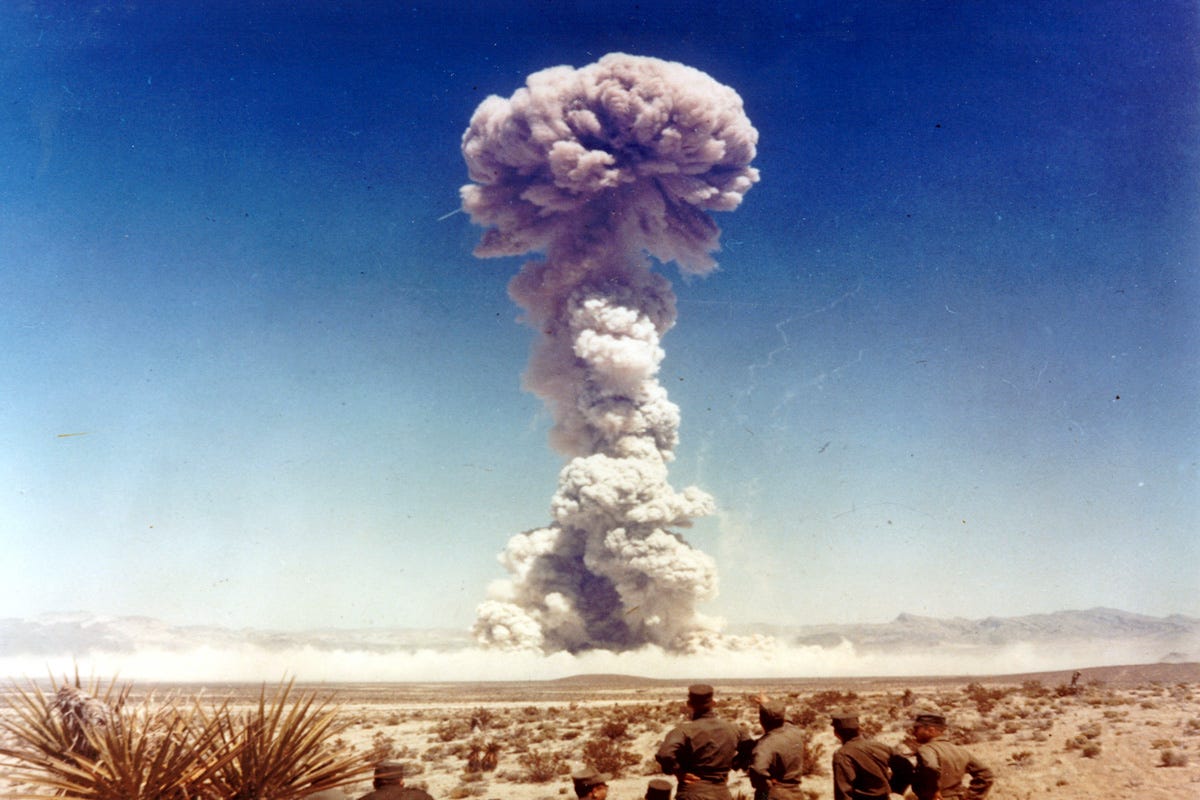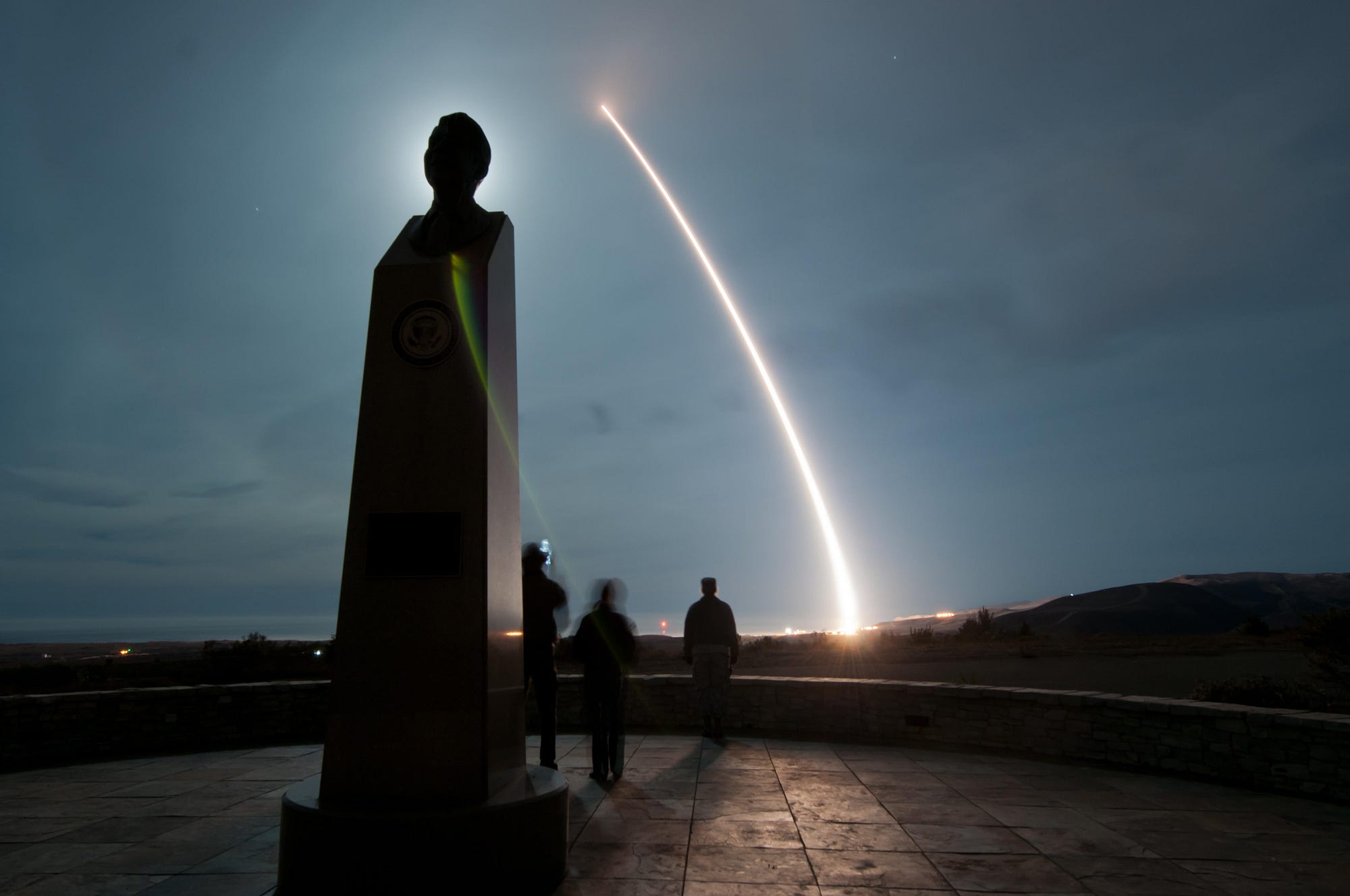by GEOFF WILSON and WILL SAETREN
 In the event of a rapidly escalating conflict with the Russians, should the United States conduct a “limited” nuclear strike to coerce the enemy to back down? Or, in Cold War nukespeak, should the United States “escalate to deescalate” the situation?
In the event of a rapidly escalating conflict with the Russians, should the United States conduct a “limited” nuclear strike to coerce the enemy to back down? Or, in Cold War nukespeak, should the United States “escalate to deescalate” the situation?
Believe it or not, that is a real question that is being debated in the Pentagon today. And the answer is no. Thinking we can use nuclear weapons in a “limited” way without inviting nuclear catastrophe is a dangerous fantasy.
Here is the hypothetical scenario. Russia decides to annex part, or all of, NATO ally Latvia, much like it did with the Crimean Peninsula. Russian forces cross the border, and NATO is forced to respond with a mixed force of U.S. Army brigades, U.S. Marines, air wings, special forces and allied personnel.
All of the sudden, a full-fledged war is threatening to engulf Northern Europe.
Fearing that the fighting will spill over into the rest of Europe, or even break out in Poland or the Ukraine, the United States launches a “tactical” nuclear strike against Russian forces on the border of Latvia.
The hope is that this will cause Russian commanders to pause amidst the destruction, and take a second to reconsider their options now that nuclear force has been used.
In theory, that pause would be enough time for cooler heads to prevail — and for the State Department to cable the Kremlin and hammer out some kind of ceasefire.
To Pentagon planners, this scenario is a legitimate one.
The Air Force already has plans to field a new, low-yield, air-launched nuclear cruise missile that it refers to as the Long Range Standoff Weapon, which critics argue is tailored for limited nuclear war fighting.
“Beyond deterrence, an LRSO-armed bomber force provides the president with uniquely flexible options in an extreme crisis, particularly the ability to signal intent and control escalation,” Frank Kendall, the Pentagon’s top weapons-buyer, told Congress.
But once we’ve opened Pandora’s Box, is it possible to close it again? With thousands of Russian soldiers dead or dying on the Latvian border, would the Russians really just stand down?
Would the United States?
A test of an unarmed U.S. Air Force Minuteman nuclear ballistic missile. Photo via Wikipedia
Proud Prophet
At the height of the Cold War, the Reagan administration worried about the effectiveness of the U.S. nuclear war plan. In fact when he was first briefed on the U.S. strike plan, Reagan became physically ill and the briefing had to be postponed.
In 1983, amidst heightened tensions with the Soviets, the administration put the U.S. war-plan to the test in a war game called Proud Prophet.
According to author and Defense Department advisor Paul Bracken, it was unlike any other war game in Cold War history. Whereas most other war games cast staffers from think tanks, former administration officials and pentagon employees in the roles of U.S. president or Soviet commanders, Proud Prophet involved actual U.S. national-security decision-makers, including Secretary of Defense Caspar Weinberger and the chairman of the joint chiefs.
Furthermore, “to make it as realistic as possible, actual top-secret U.S. war plans were incorporated into the game … [making it] the most realistic exercise involving nuclear weapons ever played by the U.S. government during the Cold War,” Bracken wrote.
The simulation played out around the clock for two weeks, with “hundreds of military officers participating in Washington as well as communicating over top-secret links with all the major U.S. military commands around the world.”
The result? “Many of the strategic concepts proposed to deal with the Soviet Union were revealed to be either irresponsible or totally incompatible with current U.S. capabilities and immediately thrown out.”
Chief among them were the use of limited de-escalatory nuclear strikes. Like in our hypothetical scenario above, “the idea behind these was that once the Soviet leaders saw that the West would go nuclear they would come to their senses and accept a ceasefire … they were supposed to limit a nuclear war.”
But that isn’t how it played out.
“The Soviet Union team interpreted the nuclear strikes as an attack on their nation, their way of life and their honor,” Bracken wrote. “So they responded with an enormous nuclear salvo at the United States.
“The United States retaliated in kind. The result was a catastrophe that made all the wars of the past five hundred years pale in comparison. A half-billion human beings were killed in the initial exchanges and at least that many more would have died from radiation and starvation. NATO was gone. So was a good part of Europe, the United States and the Soviet Union. Major parts of the Northern Hemisphere would be uninhabitable for decades.”
Unfortunately, we have forgotten these lessons.

No comments:
Post a Comment